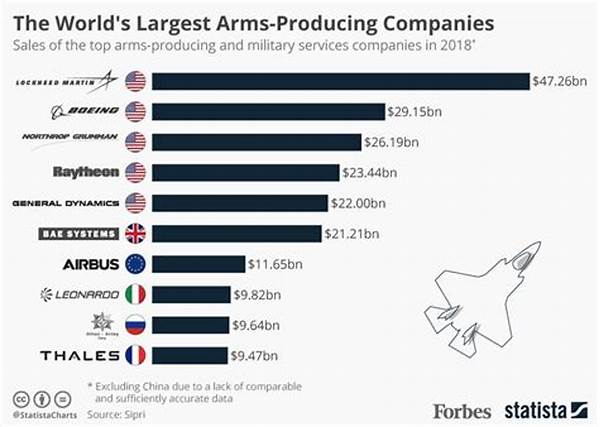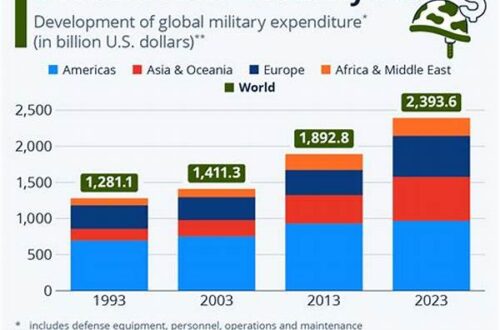Global Trends in Military Hardware Procurement
The dynamics of worldwide military hardware sales have evolved significantly over the past few decades, driven by technological advancements, geopolitical tensions, and shifts in defense strategies. This sector encompasses the trade of a wide array of equipment ranging from basic ammunition to advanced fighter jets and missile systems. Nations across the globe are increasingly investing in modernizing their military capabilities to enhance national security and assert global influence. Consequently, the global military hardware market has witnessed a substantial increment in transactions, with expenditures running into billions of dollars annually. The intricate interplay between suppliers and buyers in the global arms trade influences international relations, economic frameworks, and security architectures in various regions.
Developments in military technology have also contributed to the surge in worldwide military hardware sales. The introduction of cutting-edge technologies, such as artificial intelligence, drone warfare, and cyber capabilities, has revolutionized traditional notions of warfare. Nations are compelled to update their arsenals to integrate these technological advancements, leading to increased procurement activities. Additionally, the formation of defense alliances and partnerships among countries fosters collaborative sales and acquisition strategies, further augmenting the global military trade. Consequently, nations are leveraging military hardware procurements to not only bolster defense mechanisms but also to reinforce diplomatic relations and strategic partnerships.
Furthermore, the constant evolution of threats necessitates continual assessment and enhancement of defense systems, prompting countries to invest heavily in the procurement of sophisticated military equipment. This ongoing demand for modernization and innovation propels the worldwide military hardware sales, making it a crucial aspect of national defense policies. The strategic importance of the global arms market is thus underscored by the need for nations to secure their borders, deter potential threats, and maintain a state of readiness in an unpredictable global security landscape.
Key Players and Market Dynamics
The realm of worldwide military hardware sales is dominated by a few key players who exert significant influence over the market. Countries such as the United States, Russia, China, and several European nations are among the leading exporters, controlling a substantial share of the global arms trade. These countries possess advanced manufacturing capabilities, extensive research and development infrastructure, and a diverse portfolio of military equipment. Their dominance in the market is sustained through strategic alliances, technological superiority, and competitive pricing strategies.
1. The United States remains the largest exporter in worldwide military hardware sales, leveraging its cutting-edge technology and strategic alliances to maintain global leadership.
2. Russia has solidified its position as a major supplier, offering competitive pricing and extensive networks in various regions to bolster its worldwide military hardware sales.
3. China is rapidly expanding its share of worldwide military hardware sales, focusing on indigenous innovations and increasing its presence in emerging markets.
4. European nations collectively contribute significantly to worldwide military hardware sales, capitalizing on their advanced technological capabilities and strategic collaborations.
5. The interplay between geopolitical interests and economic considerations drives the dynamics of worldwide military hardware sales, influencing market trends and procurement decisions.
The Role of Innovation and Technology
Technology plays a pivotal role in shaping worldwide military hardware sales. As nations seek to develop and deploy sophisticated defense systems, technological innovation becomes an essential determinant of market competitiveness. The industry is witnessing the integration of artificial intelligence, cyber capabilities, and autonomous weapon systems, prompting a paradigm shift in defense strategies and procurement priorities. These advancements offer unparalleled operational advantages, enabling nations to enhance their defense postures and respond more effectively to emerging threats.
Moreover, the incorporation of innovative technologies in military hardware necessitates substantial investments in research and development, fostering collaboration between governments and the private sector. This collaboration accelerates the pace of innovation and ensures the timely deployment of advanced systems in the field. As a result, countries that emphasize technological prowess in their defense strategies are better positioned to influence worldwide military hardware sales. The continuous evolution of technology underscores the critical importance of technological capabilities in maintaining competitive advantages in the global arms market.
In tandem with innovation, the defense sector is also prioritizing sustainability and operational efficiency. As global awareness of environmental impacts grows, efforts to minimize the ecological footprint of military operations are becoming increasingly vital. Consequently, stakeholders in worldwide military hardware sales are incorporating sustainable practices in the manufacturing and lifecycle management of military equipment. This trend underscores the intersection of technological innovation and environmental responsibility in the modern defense landscape.
Economic Implications of Military Expenditure
Military expenditures have far-reaching economic implications that extend beyond the immediate scope of defense strategies. Worldwide military hardware sales contribute significantly to the economic growth of exporting countries, creating jobs, driving technological advancements, and enhancing industrial capabilities. The defense industry is a critical component of national economies, underpinning sectors such as manufacturing, research, and engineering. The economic multiplier effect of defense spending stimulates growth and innovation across various industries, reinforcing the interconnectedness of national and global economies.
However, the economic implications of military expenditures are not without challenges. High levels of defense spending may strain national budgets and divert resources from other critical areas such as healthcare, education, and infrastructure development. Consequently, countries must balance military investments with broader socio-economic priorities to maintain sustainable growth. The strategic allocation of resources to worldwide military hardware sales requires comprehensive assessments of national security needs, economic capabilities, and long-term policy goals.
Additionally, fluctuations in military spending can impact the stability of the global arms market. Economic recessions, geopolitical tensions, and shifting defense policies influence procurement trends and market dynamics. As such, stakeholders in worldwide military hardware sales must navigate these complexities to ensure long-term market sustainability. The economic dimension of military expenditures thus underscores the intricate relationship between defense strategies and economic policies in shaping the global security landscape.
Strategic Alliances and Procurement Policies
Strategic alliances and procurement policies are instrumental in shaping the landscape of worldwide military hardware sales. Bilateral and multilateral agreements between countries facilitate the exchange of military technology, expertise, and resources, bolstering global security architectures. These alliances also promote interoperability between defense systems, enhancing collective defense capabilities and fostering greater international cooperation. Additionally, procurement policies play a crucial role in determining the nature and scope of military acquisitions, aligning defense priorities with national security objectives.
Countries often leverage strategic alliances to gain access to advanced military technologies and enhance their defense postures. These partnerships not only promote the standardization of defense equipment but also enable knowledge transfer and capacity building initiatives. Consequently, nations involved in strategic alliances are better equipped to address contemporary security challenges and contribute meaningfully to worldwide military hardware sales. These cooperative frameworks underscore the importance of diplomatic engagements and strategic partnerships in the global arms market.
Procurement policies, on the other hand, reflect the broader defense strategies and priorities of nations. Policymakers must assess emerging threats, technological trends, and geopolitical dynamics to inform procurement decisions and optimize defense investments. The formulation of effective procurement policies is critical to achieving a balanced and efficient approach to worldwide military hardware sales. These policies ensure that military acquisitions align with national defense objectives, budgetary constraints, and long-term security imperatives.
Challenges and Ethical Considerations
The proliferation of worldwide military hardware sales presents a myriad of challenges and ethical considerations that demand thoughtful examination. Issues related to arms control, non-proliferation, and human rights play a significant role in shaping the discourse around the global arms trade. The increased availability of sophisticated weaponry raises concerns about the potential for misuse and the escalation of conflict in volatile regions. As a result, international regulatory frameworks and agreements seek to impose controls on the transfer and use of military hardware to mitigate these risks.
One of the primary challenges in worldwide military hardware sales is ensuring compliance with international law and maintaining accountability in arms transfers. Transparency in transactions and adherence to export control regimes are critical in preventing the diversion of military equipment to unauthorized entities. Nations must work collaboratively to strengthen monitoring mechanisms and enhance the traceability of arms transfers. By fostering greater accountability and transparency, the international community can mitigate the negative impacts of illicit arms trade and contribute to global peace and security.
Moreover, ethical considerations surrounding the use of advanced military technologies, such as autonomous weapon systems and artificial intelligence, warrant careful deliberation. The deployment of these technologies raises questions about accountability, human oversight, and the potential for unintended consequences. Ensuring that the development and deployment of such technologies adhere to ethical and legal standards is essential to safeguarding human rights and maintaining global stability. These considerations underscore the need for a comprehensive and ethical approach to worldwide military hardware sales.
Summary of Worldwide Military Hardware Sales
In summary, the dynamics of worldwide military hardware sales are shaped by a complex interplay of technological advancements, geopolitical considerations, and economic imperatives. As nations seek to bolster their defense capabilities in an increasingly uncertain global security environment, the demand for sophisticated military equipment continues to rise. The integration of innovative technologies and strategic alliances further accentuates the significance of the global arms trade, influencing defense strategies and international relations.
The economic implications of military expenditures extend beyond defense strategies, impacting national budgets, industrial capabilities, and technological innovation. Stakeholders must balance military investments with broader socio-economic priorities to ensure sustainable growth and stability. Additionally, ethical considerations and regulatory frameworks play a critical role in shaping the global arms market, addressing concerns related to arms control, accountability, and human rights.
The challenges and opportunities associated with worldwide military hardware sales highlight the need for a collaborative and responsible approach to the global arms trade. By prioritizing transparency, accountability, and ethical considerations, the international community can collectively address the complexities of military hardware procurement. As the sector continues to evolve, stakeholders must remain vigilant and proactive in navigating the intricate landscape of worldwide military hardware sales to enhance global security and stability.





